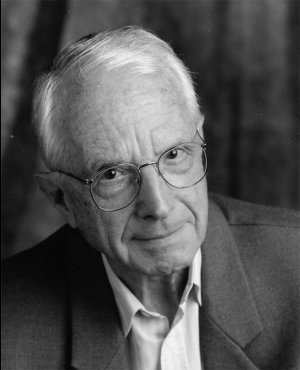
„The psychology we looked for at that time was one of concern—you might also call it one of compassion, of involvement with real life.“
(Ernst E. Boesch)
Ernst Eduard Boesch (December 26, 1916 - July 12, 2014) was born in St. Gallen, Switzerland, where he also spent his early school days. In 1939 he began to study medicine in Geneva, but changed his plans in favour of studying psychology, pedagogy and philosophy at the Jean-Jacques Rousseau Institute. The Institute was then managed by the psychologist Édouard Claparède and the pedagogue Pierre Bovet. One of Boesch’s later teachers was Jean Piaget; he also attended lectures of André Rey and Richard Meili.
In 1942 Boesch had his first marriage, which lasted 18 years and out of which three children emerged. In 1943 he returned to St. Gallen as a school psychologist after he had refused an assistant position at Piaget’s chair. In 1946 he received his doctorate with a thesis on challenges for school psychology.
In 1951 he accepted the position of chair of psychology at the Saarland University of Saarbrücken, which was founded in 1948 and did not yet belong to the Federal Republic of Germany. Until 1969, his chair remained the only chair of psychology at the university. Saarbrücken was to remain Boesch’s permanent residence for the rest of his life and despite various calls to other universities (Brussels, Mannheim, Bochum, Geneva and Basel) he has never given up his professorship at Saarland University.
In 1955, Boesch went to Bangkok for three years at the invitation of UNESCO and served as director of the International Institute for Child Study. He adapted psychological tests for the Thai context and carried out various developmental and school psychological investigations. In the same period he began to learn the Thai language, which he mastered perfectly over the years. In his teacher, Supanee, he also got to know his great love and his second wife, with whom he spent the rest of his long life.
On Boesch’s initiative, the University of Saarbrücken founded the Institute for Development Aid in 1962, which was later renamed the Social Psychological Research Centre for Developmental Planning (SFE). Boesch became director of the institute and held this position beyond his retirement until 1987.
Ernst Boesch is one of the most important pioneers of cultural psychology in the 20th century. Based on his experiences in Asian, especially in Thai contexts, in his manifold scientific contributions he dealt critically and constructively with mainstream psychology and its methodology. In the German-speaking world, he may be regarded as the nestor of a modern cultural psychology as it is laid down in his so-called symbolic theory of action. His work had a considerable and lasting influence on the continental European character of the discipline. At the same time, Ernst Boesch, with his strong focus on everyday psychological issues and phenomena, was one of the most important pioneers in ecological psychology.
Ernst Boesch’s extremely rich work is interdisciplinary, integrates theories and approaches from fields such as psychology, psychoanalysis, ethnology and philosophy and is devoted to a wide range of topics such as plot, identity, subjectivation, strangeness, language, narration, polyvalence, physicality, emotion, cognition, development and development planning, art and aesthetics, longing, religion, rituals, etc.
Ernst Boesch’s work has received international recognition: honorary doctorates from the Universities of Berne and Srinakharinwirot, the Order of the Crown of Thailand, the Saarland Order of Merit, the Dr. Margrit Egnér Foundation Prize and honorary memberships in various scientific associations. In memory of Ernst E. Boesch, the Society for Cultural Psychology, which is based in Salzburg, Austria, has been awarding the Ernst E. Boesch Prize for services to the promotion and dissemination of scientific cultural psychology since 2015.